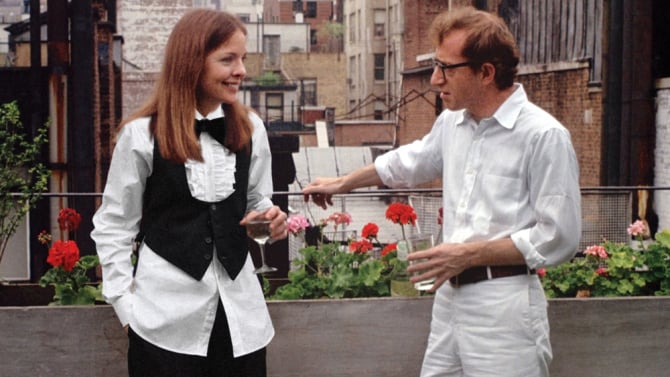As we look forward to the Oscars this Sunday, the Daily looks back at seven masterpieces that took home Best Picture in the past.
“Sunrise: A Song of Two Humans” (1927)
Winner of the only Academy Award for Best Artistic Production, F.W. Murnau’s “Sunrise” is a wonder to discover. It’s an archetypal fairy tale; as its opening title suggests, it is “any place and no place.” The characters have no names. The plot is simple. A husband is persuaded by a woman from the city to kill his wife; he ends up not going through with the plan, instead taking the wife on a date through the city. Temptation occurs. Redemption is needed. Redemption is granted. On paper, it sounds trite. But Murnau transforms this parable into a consummate celebration of artistic expression. It’s the little moments in “Sunrise” — the husband looming over the wife with Nosferatu-like terror — that make it such a moving masterpiece of silent cinema.
“It Happened One Night” (1934)
Frank Capra (“Mr. Smith Goes to Washington,” “It’s a Wonderful Life”) is a rare, starry-eyed believer in the glory America represents. But with “It Happened One Night,” the film that defined the screwball comedy genre, he gleefully ripped America a new one with square-angled performances and acidic-acerbic comedy. Hyperactive Claudette Colbert and a blasé Clark Gable won Oscars for their definitive portrayals of an American couple who hate each other’s guts but can’t live without one another. The sly Capra highlights the disparities between classes and genders in America with an anarchic bend that matches the bawdy tones of Preston Sturges. And really, what’s a more American way of ending your movie than ditching a wedding mid-vow and escaping in a pick-up truck full of dirt and hay?
“How Green Was My Valley” (1941)
John Ford’s masterpiece about a Welsh coal miner’s family is often only known as “the movie that beat ‘Citizen Kane’ at the Oscars.” But it’s so much more than that. It’s a coming-of-age story about a lad named Huw and his experience growing up poor in a sleepy 19th century mining town in Wales. John Ford, better known for his Westerns, moves us just about to tears with this expressive tale of familial love, restoring our faith in our fellow human beings. Warm, soft and empathetic, Ford’s film asks the tough questions: How do we support our families when we’re trying to start our own? Can idealistic, youthful love survive in adulthood? How do we measure success in life?
This Homeric poem is a more muted film than critics’-darling “Citizen Kane,” but somehow that makes it all the richer.
“The Best Years of Our Lives” (1946)
Very few films can ever hope to claim the broad appeal of something like “The Best Years of Our Lives.” It’s a 3-hour epic about three homecoming vets — a rich banker (Frederic March), a disabled soldier who’s learned how to use prosthetic hooks for hands (Harold Russell) and a PTSD-riddled pilot (Dana Andrews). They all face the pressure of integrating back into a society where life doesn’t stop for anybody. Beneath its surface sentimental view of “aw-shucks” America, however, lies a tragic portrait of jaded people who doubt the future. Its politics aren’t liberal or conservative or moderate — they’re simply human.
“The Apartment” (1960)
No words could ever hope to fully convey my love for Billy Wilder’s “The Apartment,” one of the best rom-dram-coms in existence. Everything about it is so perfectly constructed — not a shot wasted, not a beat missed. National treasure Jack Lemmon plays meek-and-week C.C. Baxter, an anonymous accountant at a big New York office who falls in love with Fran elevator girl (Shirley MacLaine). There is one problem, though: Fran is the mistress of Baxter’s boss (a cold Fred MacMurray).
Coming to grips with one’s emotions when watching “The Apartment” is coming to terms with the magic of movies. Characters like Lemmon’s bashful Baxter and MacLaine’s fractured Fran aren’t just celluloid plasticities that idealize the hell out of our lives and who we are. They are us. They share our worries and desires. Movies like “The Apartment” mix fictional storytelling with life-changing rawness and honesty.
“The French Connection” (1971)
This down-and-dirty crime thriller from William Friedkin (“The Exorcist”) still packs one hell of a wallop today. (Only “Max Max: Fury Road” can seriously give it a run for its money.) Gene Hackman has never been better as good-bad cop Popeye Doyle, a mean detective who becomes obsessed with taking down an international heroin syndicate led by a crafty criminal mastermind (Fernando Rey). This grimy tale of morality gone haywire uses New York as its scuzzy, hard-edged playground. Look out for the scene of Hackman’s chaotic car-chase through the streets of Brooklyn — it rivals Buster Keaton’s “The General” as one of the best sustained pieces of action Hollywood cinema has to offer.
“Annie Hall” (1977)
“Just about everybody’s favorite Woody Allen movie,” Roger Ebert once wrote of “Annie Hall,” and he’s not wrong. Allen wrote, directed and starred in this classic rom-com about a neurotic Jewish comedian who’s sifting through the pieces of a failed relationship with an easy-going singer named Annie Hall (tie-wearing Diane Keaton, in an Oscar-winning performance). Allen and Keaton’s rapport is electric. The movie is crafted with a light, delicate touch for human warmth that’s quite unlike the intellectual hipsterisms of Allen’s other work. Going conventional, he hits emotional peaks that have yet to be matched. People don’t like that this won Best Picture over “Star Wars” in 1977, but I can’t complain.
Contact Carlos Valladares at cvall96 ‘at’ stanford.edu.
